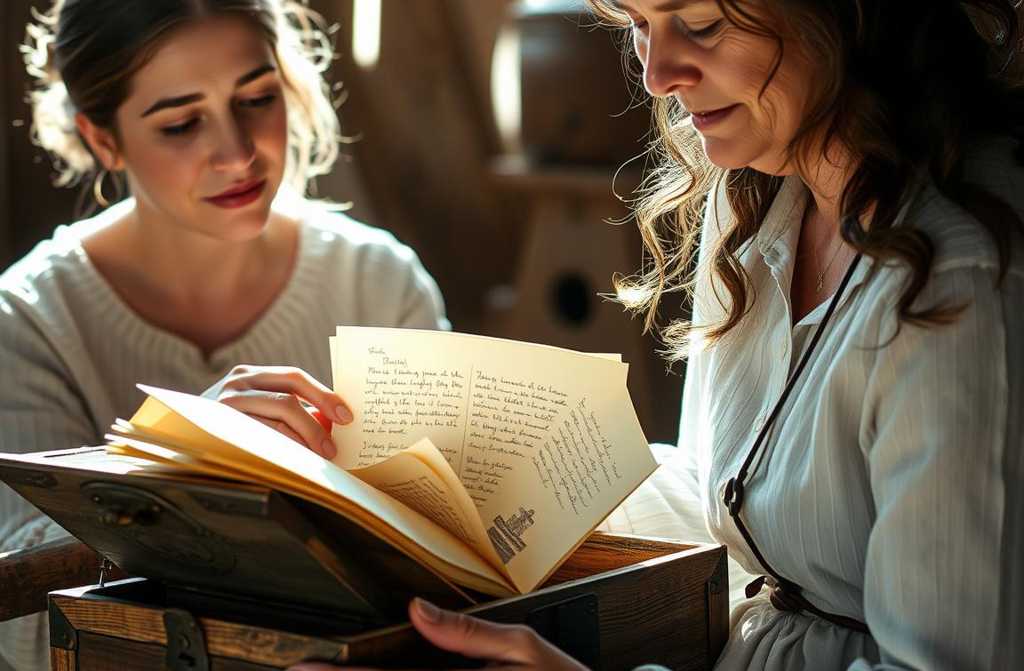**Diary Entry**
No, Mr. Wilkinson, I cant have it ready by morning! Its physically impossible! My team works eight-hour days, not twenty-four!
Emily paced her tiny kitchen, pressing the phone to her ear so hard it mightve left a mark. On the other end, her bosss irritated growl droned on.
Emily, I dont care about excuses. The project goes ahead. Motivate them. Pay overtime. Thats your responsibility. The client presentation is at nine tomorrow. If we fail
We wont fail, she muttered through clenched teeth. Itll be done.
She ended the call and hurled the phone onto the sofa, her hands shaking with frustration. Same story, different day. The last five years had become a blur of deadlines, presentations, and exhaustion. She was a successful project manager at a London firm, earning good money, but she felt hollow. No joyjust fatigue.
Her gaze landed on an old photo in a frame on the shelf. A grey-haired woman with kind eyes smiled back. Grandma. Margaret Hayes. A sudden, almost painful longing to be back in her quiet cottage in the countryside washed over Emilyfar from London, her grumbling boss, and sleepless nights.
The decision came in a flash. She grabbed her phone.
Gran? Hi, its me. How are you? No, nothings wrong. I just missed you. Listen, can I come stay for a couple of weeks? Yes, tomorrow. Ill take leave. Im sick of this city.
Within an hour, shed submitted unpaid leave, bought a train ticket, andfor the first time in agesfelt a strange calm. The project would get done. Shed push herself and her team through the night. But by morning, shed be gone.
The train rolled south, lulling her with the rhythm of the tracks. Fields, small woods, sleepy stations flashed by outside. With each mile, the tension in her shoulders eased.
The village welcomed her with warm wind, the scent of cut grass, and the neighbours terrier barking excitedly. Gransmall, wiry, but still stronghugged her so tightly she gasped.
There you are, my little city sparrow, she grumbled, though her eyes sparkled. Skin and bones, you are. Come in, Ive made stew. With herbs from the garden.
The house smelled like childhood: fresh bread, lavender, and something indefinably cosy. Emily dropped her bag in her old room with its carved wooden bed and collapsed onto it, eyes closed. Real silencejust bees humming outside and the tick of the grandfather clock in the hall. Bliss.
The first few days slipped by. She slept, ate Grans scones, wandered the village greeting old-timers who remembered her as a girl. She helped in the garden, weeding beds, watering tomatoes. Simple work under open skies healed better than therapy.
Emily, Gran said one evening over tea. Help me clear the shed. Too much clutter after fifty years. Best sort it while I still can.
Gran, dont talk like that, Emily frowned. Youll outlive us all. Of course Ill help.
The shed was a weathered wooden structure, half-swallowed by ivy. Inside, dust motes floated in shafts of light, illuminating rusted tools, cracked flowerpots, stacks of yellowed newspapers.
Blimey, Gran, thisll take a week, Emily sighed.
Eyes bigger than your belly, eh? Gran handed her gloves. Start at the back.
They worked for hours, hauling out old paint tins, a broken wheelbarrow, mildewed blankets. Emily sneezed but felt oddly satisfiedlike she was clearing space inside herself, too.
Behind a stack of rotten planks, she found a wooden chest with an iron latch. Unlocked.
Gran, whats this?
Margaret squinted. Oh, Id forgotten that. Your grandads. Thomas made it himself when he was young. After he passed, I shoved it here couldnt bring myself to open it.
Emily barely remembered Grandad Thomas. Hed died when she was threejust a hazy image of a tall, quiet man with warm hands. Gran rarely spoke of him, and when she did, there was always sadness.
Lets look, Emily said, curiosity stirring.
Gran nodded silently.
The hinges groaned as the heavy lid lifted. Inside lay stacks of papers tied with ribbon, leather-bound notebooks, and a small carved box. Emily lifted one journal. Faded ink on the cover read: *Diary.*
He kept diaries?
Quiet man, your grandad. Wrote most evenings. Never said what about.
Emily flipped to a random page. Neat handwriting filled the yellowed papernot daily chores, but poetry.
*”Your eyestwo pools of forest shade,
Where my soul drowns, unafraid.
The world stills, the air grows thin,
When your touch, like wings, brushes my skin.”*
Emily gaped at Gran. He wrote poetry. And its beautiful.
Margaret took the book, adjusted her glasses, and studied the lines. Her wrinkled face showed no surprise, only quiet sorrow.
Yes, he did. But not for me.
What?
Take these inside if you like. Ive goats to milk.
She left Emily bewildered in the dusty shed.
That evening, Emily devoured the journals. This wasnt the stern, silent man shed heard about. These pages revealed someone passionate, vulnerablea man who wrote of love, stars, lifes meaning. And one name reappeared: *Lillian.*
*”Saw Lillian at the well today. Her laugh lit the air. Why am I such a coward? Why cant I just say hello?”*
*”Lillians leaving for university. The village will be grey without her. I shouldve spoken. Shouldve told her.”*
*”No reply to my last letter. Shes found her life in the city. And Im here, with unspoken words and poems no one will read.”*
Emilys throat tightened. This was a love storyunrequited. Her grandad had loved another woman. What about Gran? Had he married her after?
At tea the next day, she ventured, Gran tell me about Grandad. What was he like when you met?
Margaret gazed at the apple trees. Decent chap. Hardworking, quiet. Came back from National Service, and Id just left school. He barely noticed me at first. Always seemed lost.
Was he in love with someone?
Gran gave her a long look. Read about Lillian, did you?
Emily nodded.
Knew youd dig that up, she sighed. Lillian Hart. Doctors daughter. Pretty thingall the lads fancied her. Your grandad too. But he was shy, scribbling poems while she barely knew he existed. She went to uni, married some professor.
But you how did you marry?
Gran chuckled. The village way. Parents arranged it. He was steady, didnt drink. I was respectable. We made do. He didnt love me, but he was kind. A good father. Never heard a cross word from him in thirty years. Built this house. Raised your mum. Never mentioned Lillianbut sometimes Id catch him on the porch at dusk, writing, staring at the road to town. Like he was waiting.
Silence settled. Emily understood thentwo lives lived side by side, yet never truly entwined.
Gran werent you angry?
Angry? She shook her head. Young and foolish, maybe. Thought if I baked enough pies, hed love me. Then I learnedyou cant force hearts. Loves like lightning: bright, loud, gone quick. Respect and habit last. We had a good life. Quiet.
Emily saw her thennot just a village woman, but someone wise and strong, whod carried her own quiet love without bitterness.
Days passed. Emily kept sorting the chest. Besides diaries, there were lettersthree replies from Lillian. Polite, brief, almost dismissive. She called his poems sweet, wrote of her exciting studies, then finally asked him to stop writingshe was engaged.
In the small carved box, Emily found what shattered her heart anew: a single faded photograph of a young woman with a serious gaze. On the back, in Grandads hand: *”Lillian. Forever.”* Beside it, a pressed cornflower.
Now she understood why Gran had avoided the chest. It wasnt clutterit was a shrine to a love that never was.
One evening, Emily asked, Gran whatever happened to Lillian?
Shes alive. Widowed years ago. Worked at the county hospital till retirement. Lives alone in Cheltenham, not far.
Emilys pulse jumped. Shes nearby?
Gran eyed her knowingly. Fancy meeting her?
It was madness. What would she say? But something felt unfinished.
The next day, they boarded a rickety bus. Emily fidgeted; Gran sat serene.
They found the addressa neat cottage with roses out front. The door opened to a tall, silver-haired woman with sharp eyes.
Yes?
Emily froze, but Gran stepped forward.
Hello, Lillian. Its Margaret. Thomas Hayes wife.
Lillian paled. I come in.
Over tea, her hands trembled. Thomas hes been gone so long.
He has, Gran said. But memories remain. Emily found his poems. The ones he wrote to you.
Lillians eyes filled. I was a fool. Young, stupid. Thought life was grander out there. His letters I didnt realise they were real. Not until it was too late. She fetched a bundle of envelopes tied with ribbon. I kept them. Reread them when I was alone. And regretted.
Three women sat in silencetwo whose lives had been shaped by one man, and one who saw, suddenly, how fleeting true love could be.
On the bus back, Emily held Grans hand. There was no bitterness in her facejust peace, as if a weight had lifted.
That night, Emily placed Lillians letters beside Grandads diaries. The story was complete.
Her leave was ending. London, deadlines, her bossthey loomed, but the thought no longer panicked her. Something had shifted. Grandads story, Grans wisdom, meeting Lillianit all made her see her own life differently. Success, moneywere they enough?
On her last evening, she sat with Gran on the porch.
Thank you, she whispered.
For what?
For letting me see this. I think I understand something now.
She called her boss.
Mr. Wilkinson, I wont be in Monday. Yes, Im resigning. No, I wont reconsider. Goodbye.
She exhaled. No fearjust certainty.
So what now, sparrow? Gran asked, not unkindly.
Dunno. Maybe stay here awhile. Help you. Then figure it out. Might write. Not poetry, but stories like yours.
As the sun set, painting the sky peach and gold, London felt like a distant dream. Here, in the quiet, with the scent of roses and an old womans steady gaze, she was home.
**Lesson Learned:** Lifes too short for empty hustle. Real happiness isnt in titles or paychecksits in quiet moments, honest love, and knowing when to walk away from what doesnt truly matter.







